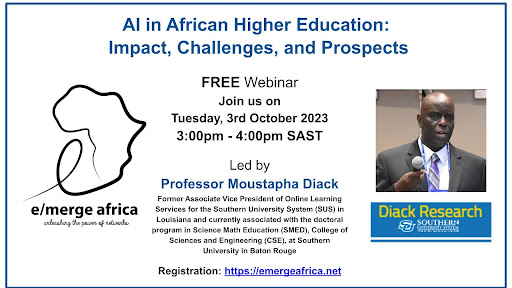Date and Time: Tuesday, 20th February 2024: 15:00 – 16:00 SAST : 16:00 – 17:00 EAT
Leading the Session: Dr. Esther Gacicio, Edtech Consultant & CEO of eLearning Solutions (eLS)
To join this session please sign up via Zoom here
Description of the session:
This session will look at the importance of integrating soft skills in higher education to ensure graduates are thoroughly equipped for the labour market.
What does the course entail and its deployment and accreditations from Kenyan universities.
Many young individuals, despite their academic achievements, find it challenging to excel in real world situations. They lack the essential soft skills that employers and life demand. To unlock this potential https://elsat.elearningsolutions.co.ke/ created the 21st Century soft skills program targeting Tertiary Institutions including Universities in Kenya.
Lead Bio:
Dr.Esther Gacicio is an Edtech Consultant & Co-Founder and CEO of eLearning Solutions (eLS) (www.elearningsolutions.co.ke; www.elsat.elearningsolutions.co.ke ), a company leveraging on digital technology to design, deliver and deploy learning and training solutions, across the spectrum; to the youth, institutions and corporates. Dr. Esther Gacicio is an Edtech Consultant & Co-Founder and CEO of eLearning Solutions (eLS), a company leveraging on digital technology to design, deliver and deploy learning and training solutions, across the spectrum; to the youth, institutions and corporates. She is a member of the Specialist Network of the EDTEch Hub. GIZ Sports for Development Course, Siemens-Stiftung “How to become a paramedic” course, AUCDC Surveillance course, STEP Ethiopia project and most recently, the ELSAT Hub 21st Century Soft-Skills Course
Dr. Gacicio previously served as a Senior Assistant Director at the Kenya Institute of Curriculum Development (KICD). Dr. Gacicio was recognized for being the best PhD student (Thesis), Faculty of Education,2021/2022 academic year at the University of Nairobi. She led ELS to receive “Most Preferred MOOCS Solution” of the Year Award 2021 at the Kenya EdTech Summit and Awards inKenya. She was awarded the Excellence in eLearning Award at the World Education Global Awards 2015 in Mumbai, India. She was also a finalist for the Africa Prize for Engineering Innovation 2017/2018 a program ran by Royal Academy of Engineering United Kingdom and the subsequent Pitch@Palace under the patronage of HRH The Duke of York, KG in 2018 as well as awarded the Technology in Government in Africa Awards (TIGA) in May, 2011.
Dr. Gacicio is currently serving as a Director in the Technical and Vocational Education and Training Authority (TVETA) board since June 2020. She serves as a Board Member and currently the Chair of the Finance and General Purpose committee of the Technical and Finance and General Purposes committees.

